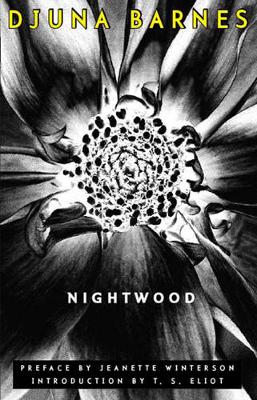Reviewed by brokentune on
Matthew,' she said, 'have you ever loved someone and it became yourself?'
For a moment he did not answer. Taking up the decanter he held it to the light.
'Robin can go anywhere, do anything,' Nora continued, 'because she forgets, and I nowhere because I remember.' She came toward him. 'Matthew,' she said, 'you think I have always been like this. Once I was remorseless, but this is another love — it goes everywhere; there is no place for it to stop — it rots me away.”
I honestly feel that I have failed this book.
Nightwood was a slight volume but I found it really hard to finish. Some of the language is intriguing but at times trying too hard and coming across as pretentious - in the end I can't make up my mind what which aspect of the book I liked enough to finish it.
There was only one character (Nora) that drew my attention and it looks like that character is being ridiculed - though I'm not sure whether the ridicule is an expression of Barnes' attitude or an expression of Barnes' view of society's contempt for that character.
I'm sure I'll get my head around it at some point.
In short, Nightwood is the story of a cast of outsiders in which Nora and Robin take centre stage. Nora falls in love with Robin, but Robin is too wrapped up in her own desires to see or care about the trail of destruction she leaves behind her.
According to Wikipedia (and therefore absolutely reliably true, probably, or not) the character of Robin was based on this lady:
Nora's character - again according to unreliable sources - seems to reflect Barnes in many ways. I have no idea whether there is an actual autobiographical connection, but having finished the book I don't care to find out.
This was a bleak rather bitter read full of pretentious and generalised statements such as:
"The heart of the jealous knows the best and most satisfying love, that of the other's bed, where the rival perfects the lover's imperfections."
or
"Sleep demands of us a guilty immunity. There is not one of us who, given an eternal incognito, a thumbprint nowhere set against our souls, would not commit rape, murder and all abominations."
And yet, the funny thing about Nightwood is that I'm still intrigued by the book because I couldn't help comparing it to Night Watch by Sarah Waters (of which I am a huge fan). The character I loved most in Night Watch is one of that could easily have been in Nightwood but where Waters likes her characters and celebrates gallantry, Barnes seemed to treat everything and everyone with disdain.
So, where Waters character expresses her view on life like this:
"Someone once said a happy ending depends on where you decide to stop your story. Then again, it could be when you realise your story is not yet over; that you are only at the end of the beginning." (Kay in Night Watch)
Barnes' character's outlook is far bleaker:
“My war brought me many things; let yours bring you as much. Life is not to be told, call it as loud as you like, it will not tell itself. No one will be much or little except in someone else's mind, so be careful of the minds you get into, and remember Lady Macbeth, who had her mind in her hand. We can't all be as safe as that.”
However, it is not just the bleak outlook that spoilt the book for me. The book starts off introducing the characters and what comes across right from the beginning is that they are all outcasts from society - some because of their physical attributes, some because of their gender, identity, or religion. Rather than to explore these differences, Barnes only emphasizes the stereotypical views held by society - but she does it in a way that seems to be at odds with the story and that seems to define and mock the character of her characters. It is never clear - or it wasn't to me - if this was meant to be irony or just Barnes being bitter and spiteful. It's a fine line and I could not make it out.
Reading updates
- Started reading
- 23 June, 2015: Finished reading
- 23 June, 2015: Reviewed
